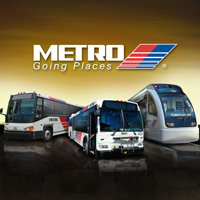Many transit riders are clamoring for smartphone payment for Metro buses and trains, which the agency originally announced would be ready by the end of 2015. Those plans have been delayed because of contract negotiations, but about 100 riders will be chosen for a test of a smartphone-based payment system in January, according to Denise Wendler, Metro’s chief information officer.
Metro approved a $244,090 contract in June with GlobeSherpa, based in Portland, Ore. The company is developing a smartphone app enabling riders to store single-ride tickets or day passes for use as needed. Riders will show the bus operator or fare inspector their valid ticket, which is designed so it cannot be copied or forged.
Current and potential riders are eager for smartphone options, Metro board members said.
[…]
For the initial March unveiling, Wendler said the smartphone payment system will have the ability to accept and verify Metro’s common $1.25 fare and a $3 day pass option. Smartphone options will come later for those who receive discounts, such as seniors and students, and for park-and-ride fares, she said.
Demand also is expected to surge among commuters, Metro board member Christof Spieler said.
“I would roll out park and ride as fast as possible,” he said.
Metro, after years of encouraging Q card use, has eased up on making the cards the preferred payment source. Though the Q card system is aging and likely to be replaced in a few years, it is still the dominant method of paying for bus and train trips in the area.
I noted the pilot of this a few days ago. I have a Q card, which is paid for by my employer – I suspect there are a lot of people like me – so I’m not exactly itching to try something new. I’m sure that when the time comes, companies that subsidize transit for their employees will find a way to use the new system. For everyone else, I see no reason not to offer more options. Among other things, having a smartphone app for paying would make Metro more accessible to visitors and locals who have a short term need for transit, due to a temporary work assignment or a car that’s in the shop or whatever else. I hope this works out.
Toll agency officials are changing drivers’ payment choices as well. The agency wants to eliminate coin-operated machines and staffed toll booths along many roads, and this month it launched its first EZ TAG option that does not require a credit card.
The new reloadable toll tags, though a partnership with BancPass, are available at the Sam Houston Tollway Ship Channel Bridge toll plaza. They’ll be sold in various retail outlets after the new year, toll road authority spokeswoman Mary Benton said.
Initial purchase of the reloadable EZ TAG costs $40. The “reload kit” includes a transponder for the person’s vehicle, a card to add balance to the toll account and $15 in tolls. As the toll balance diminishes, drivers can add value to the card online or a certain locations around Houston – for now, the Ship Channel Toll Plaza. Each time the card is reloaded, BancPass, the administrator of the accounts, assesses a $2 fee.
Benton said the reloadable card is aimed at attracting people who do not want to give the toll authority credit card information, many of whom use the toll lanes infrequently.
We have EZ tags, and though we don’t use them often (mostly for trips to and from the airport), I don’t foresee that changing. If you’re going to phase out coin machines and staffed toll booths, then you’ve got to have an option for the folks who use them now. It seems a bit complicated, but that’s the tradeoff for using cash.

